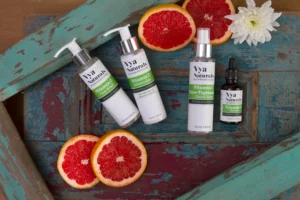Have you ever dreamed of an eternally youthful and glowing skin? If that’s your case, then I have good news for you. Actually, there’s a magical vitamin that can help you achieve the skin you see in your wildest dreams. And that’s vitamin C.
Vitamin C is generally known as a stimulant of the immune system function. However, it also acts as an antioxidant. This means that vitamin C fights against free radicals coming in contact with your skin from external sources such as air pollution.
Indeed, vitamin C is a water-soluble vitamin. Therefore, it will act in the aqueous compartments of skin cells. Whenever your skin is exposed to UV rays, vitamin C protects it from oxidative stress by y sequentially donating electrons to neutralize the free radicals.
Consequently, vitamin C has been a key ingredient in skincare for the past twenty years. Indeed, it fights against wrinkles and premature aging, and boosts the collagen production in your body.
Do you want to know more about the benefits of vitamin C for your skin? Then, let’s explore the world of vitamin C in skincare together!
Disclaimer: This post contains affiliate links to help me support this blog. I may earn a commission whenever you click on the links and purchase the products, with no additional cost to you. Thanks in advance for your support!
The Different Types of Vitamin C in Skincare Products

There are many forms of vitamin C in skincare products that are more or less effective, depending on your skin type. Let’s examine them together.
L-Ascorbic Acid
As the most potent form of vitamin C, L-Ascorbic Acid is basically the gold standard in the world of vitamin C skincare. Indeed, it has unparalleled properties in stopping oxidative stress, making it very effective in repairing and rejuvenating the skin.
However, its high effectiveness comes at a cost. Why? Because L-Ascorbic Acid has an extreme acidic nature. Consequently, it can lead to irritation and itching. Sometimes, it can even a stinging feeling when you apply it on your skin.
Moreover, L-Ascorbic Acid is not a stable form of vitamin C. Indeed, it is very sensitive to air and light, and can degrade very quickly. Therefore, you must pay great attention to the storage of your products. You may keep them in opaque air-tight containers in a cool dark environment.
Finally, L-Ascorbic Acid can cause post-inflammatory hyperpigmentation of you apply too much product.
Consequently, I wouldn’t recommend L-Ascorbic Acid to everyone. Even if it’s highly effective, I’d advise you to stay away from it if you have dry and/or sensitive skin.
Also, try to integrate L-Ascorbic Acid gradually in your skincare routine. For example, you can start with a low strength and frequency that you will increase while your skin gets used to it.
Sodium Ascorbyl Phosphate
Fortunately, you have less aggressive forms of vitamin C. However, it still delivers good antioxidant protection. Also, it has anti-inflammatory properties useful for people with acne and rosacea. If you have sensitive or acne-prone skin, this form of vitamin C is clearly the one you need.
Ascorbyl Palmitate
This form of vitamin C is fat-soluble. Also, it offers a good balance of antioxidant protection, better stability, and reduced rick of irritation. Consequently, this form of vitamin C is less prone to quick degeneration, and will keep its effectiveness over time.
Ascorbyl Palmitate is tolerated by many skin types. Therefore, I recommend this form of vitamin C to everyone, including sensitive skin.
Magnesium Ascorbyl Phosphate
This form is vitamin C is very effective in hydrating your skin and boosting your collagen production. It is a very gentle and effective form of vitamin C that is compatible with many skin types.
I recommend this form of vitamin C to people with dry or sensitive skin who want to boost their anti-aging skincare routine.
Tetrahexyldecyl Ascorbate
This form of vitamin C is famous in skincare for its deep skin penetration and stability. Indeed, it penetrates the skin’s lipid layers more effectively. It has potent antioxidant properties. Therefore, it is very effective in evening your skin tone and stimulating your collagen production. Also, it has anti-aging and skin brightening effects.
Finally, it has a superior stability against light and air. For all the reasons, I highly recommend Tetrahexyldecyl Ascorbate for all skin types, including the sensitive ones.
Optimizing Your Skincare Regimen with Vitamin C

How should you use vitamin C in your skincare routine?
Nowadays, there are many cosmetic lines offering vitamin C cleansers, creams, and serums. As for me, the best way to include vitamin C in your skincare routine is through a serum.
Indeed, this treatment is more effective and penetrate the skin better than creams and toners. What you must choose is a serum containing 10% to 15% of vitamin C concentration.
Indeed, below this percentage, your serum might not deliver the promised benefits. And above this percentage, your serum might irritate your skin, especially if you have dry or sensitive skin.
Your skincare routine with vitamin C
Personally, I recommend you use your vitamin C serum in your morning skincare routine. Here is an example of routine:
- Cleanse and tone your skin
- Apply your vitamin C serum
- Moisturizer your face with your usual cream or gel
- Apply sunscreen
Moreover, I’ve read in The Japanese Skincare Revolution that normal to oily skin could use vitamin C products during spring and summertime.
Combining vitamin C with other products
If you combine vitamin C with other ingredients, you can increase its effectiveness and benefit from additional properties. Here are some other ingredients that blend well with vitamin C:
- Ferulic acid stabilizes and boosts the antioxidant properties of vitamin C
- Vitamin E boosts the photo protective effects of vitamin C and increases its protection properties against UV-induced damage
- Gluthathione increases the potent skin brightening properties of vitamin C. Also, this combination helps to improve your skin texture and to treat skin aging.
However, there are also combinations to avoid when you use vitamin C in your skincare routine. For instance, vitamin C won’t work very well with exfoliating acids (AHA, BHA and PHA) because of their highly acidic nature.
Also, retinoids combined with vitamin C can be an excellent choice, but this can cause skin irritation on sensitive skin. For this reason, many dermatologists recommend you use retinoids and vitamin C at different times during the day. For example, you may use a vitamin C serum in the morning. Then, you can use your retinol serum for your evening skincare routine.
Addressing Skin Concerns with Vitamin C

Because of its antioxidant properties, you can use vitamin C to effectively address many skin concerns.
Protects your skin against sun damage
Thanks to its antioxidant properties, vitamin C helps to protect your skin against the harmful effects of sun exposure. However, this doesn’t mean that you can use a vitamin C serum instead of a sunscreen.
Actually, it can never replace the protective role of sunscreen against UV rays. But vitamin C can help relieve your burn if UV rays get under your skin.
Lightens dark spots
Vitamin C skincare products help to lighten patches that are darker than the rest of your skin, a.k.a. hyperpigmentation.
Smoothes your wrinkles
According to some studies, vitamin C can reduce the appearance of wrinkles on your skin if you use for at least 12 weeks. Therefore, you shouldn’t be surprised to see that this ingredient is present in many anti-aging skincare lines!
However, this anti-aging effects can be completed with a diet enhancing foods rich in vitamin C. Therefore, don’t forget to eat citrus fruits, broccoli, red peppers, and spinach in your daily diet. You can read my article about foods for a beautiful skin for more information.
Boosts collagen
When you apply vitamin C on your skin, it encourages new collagen to grow within your skin. Indeed, this protein is essential to keep your skin from sagging. Therefore, vitamin C maintains the collagen you already have and protects it from further damage.
Promotes skin healing
Applying vitamin C on your skin can help heal your wounds more quickly. Indeed, it will help your body to produce the collagen necessary to heal your injury. To maximize the effects of your vitamin C skincare products, you can add vitamin C supplements.
One day, a friend of mine recommended I took the Ester form of Vitamin C because it had prolonged effects during the day. And I never looked back!
Potential Pitfalls: Using Vitamin C Carefully

As we saw earlier, overusing vitamin C can have potential side effects. Indeed, you can have itches, rashes, hives, and redness appearing on your skin.
Consequently, I recommend you always perform a patch test on your wrinkle before applying your vitamin C products. This is a very effective way to check for irritations or potential allergies. Discontinue if you notice any negative reaction on your skin.
In addition, I’d recommend you introduce vitamin C in your routine gradually. Start with an application every two days, especially if you use products containing L-Ascorbic Acid. Then, if you’re comfortable, you can start using your vitamin C products everyday.
Though you have forms of vitamin C that are more stable than others, I recommend you always store your products in opaque air-tight containers. If you store them in cool and dark environment, that would even be better! This will help keep their potency and effectiveness intact.
The Evolving Science of Vitamin C in Dermatology

Research on the effects of vitamin C is limited. However, ongoing existing research has demonstrated its effective delivery into the dermis for stimulating collagen production and scavenging free radicals.
In the future, vitamin C will remain a mainstream ingredient in the skincare industry. And this applies for every brand, be it high-end like SkinCeuticals or affordable like Garnier or L’Oréal.
To maximize its potent effects on the skin, combination with other active ingredients will be envisaged. For example, a study of 2020 showed a very interesting result. Indeed, a combination of vitamin C, zinc, and tyrosine increased the bioavailability of vitamin C 20 times more than just vitamin C alone.
Moreover, combination with niacinamide to boost its anti-aging properties already exists in the cosmetic industry. However, some studies might suggest that this combination may make vitamin C less effective.
My favorite vitamin C products

Among all vitamin C products existing on the market, here are my favorite:
- SkinCeutcals CE Ferulic Serum (not an affiliate link): a classic serum for its potent effects and visible results on the texture of your skin. However, it’s expensive, so you must consider your budget before buying it!
- Perricone MD Vitamin C Ester CCC + Ferulic Brightening Complex 20%: this is also expensive and has a high concentration in vitamin C. However, I’ve never been disappointed in Dr Perricone’s products. It’s also expensive so you must assess your beauty budget carefully!
- Advanced Clinical Vitamin C Body Lotion and Serum: an excellent value for money. I really like the texture of the serum and it lasts longer!
- Ole Henriksen Let’s Get Luminous Brightening Vitamin C Essentials Set: if you don’t have lots of money, try this travel size set. These products are made with 97% of natural products, including fruit extracts. You won’t be disappointed!
- Palmer’s Skin Success Dark Spot Corrector Fade Serum with VitaminC, Vitamin E and Niacinamide: a powerful combination of vitamin C, vitamin E, retinoids, and niacinamide to reveal your brightest complexion at an affordable price. However, you should keep in mind that this might be less effective and potential irritant because of the presence of niacinamide and retinoids.
Whatever the product you choose, make sure that your skin is able to handle it. If you have any doubt, visit your dermatologist for further guidance.
Conclusion: how is exploring the world of vitamin C in skincare going?

As we have seen in this article, vitamin C is very important for its antioxidant properties. Indeed, it is very potent for its anti-aging and brightening properties. This makes it very useful in your skincare routine, especially if you use it in a serum.
However, you should be careful when using vitamin C as it is very acidic. Also, you shouldn’t hesitate to check the other ingredients that will increase and maximize the potent effects of vitamin C on your skin. Read the labels!
Well, that’s it for today! What do you think of my exploration of the world of vitamin C in skincare? Do you use vitamin C in your daily skincare routine? Feel free to share in the comments below!
Take care, lovelies!
Want more content from me? Join my newsletter today and received the latest updates of my website. Also, you’ll receive a wonderful gift in your email!





Thank you for this most informative article. I use a Vitamin C serum a couple of times a week, but I find it rather thick and oily. Reading about all the other benefits of using Vitamin C on the skin, I should probably use it more often, however, I think I should try one of your recommendations. Can you tell me which is the most light weight on your list?
Hello Michel, thanks for your. comment! Skinceuticals has the lightest texture IMO
Hello,
The article on vitamin C in skincare provides a comprehensive overview of its benefits and various forms available in products. It emphasises vitamin C’s role as an antioxidant, protecting the skin from free radicals and promoting collagen production.
The detailed descriptions of different types of vitamin C helps readers understand which form might suit their skin type best. It also offers practical advice on how to incorporate vitamin C into a skincare routine effectively, including product recommendations and potential pitfalls to avoid.
Overall, it is a valuable resource for anyone looking to enhance their skincare regimen with vitamin C.
Blessings and Abundance
Thanks Starlight!
Hey Elodie,
Great overview of the benefits of vitamin C for skincare! I’ve been using a vitamin C serum for a few months and have noticed a real difference in the brightness and smoothness of my skin. Thanks for the helpful tips on finding a high-quality product. I can’t wait to try some of the recommendations
Marios
Thanks for your comment Marios !
Hey Elodie,
What a fantastic dive into the world of vitamin C in skincare. Very Well Done.
Have you noticed any differences in how various forms of vitamin C (like ascorbic acid vs. sodium ascorbyl phosphate) affect your skin?
Also, how do you recommend incorporating vitamin C into a skincare routine for someone with sensitive skin?
Finally, what are your thoughts on combining vitamin C with other active ingredients like retinol or niacinamide?
Thanks for sharing such insightful content – it’s always a pleasure to learn more about skincare from you!
Hello, thank you for your comment!nYou must include vitamin C gradually in your routine if you have sensitive skin. Maybe through a serum; and only apply it if you don’t notice rashes. Personally, I enjoy the combination of vitamin C with retinol and niacinamide. I’m currently using such a cream and believe me, my skin is more than satisfied!